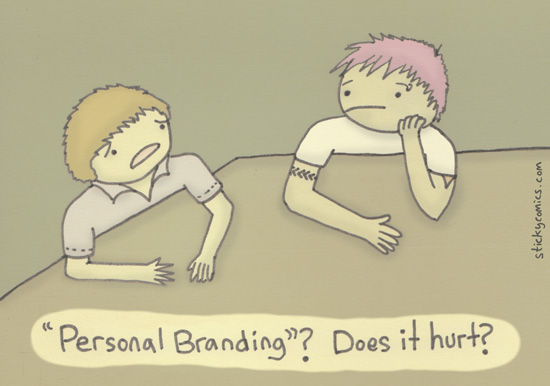We interrupt this series of posts on emotional intelligence and personal branding to bring you a timely interview with Paula Gardner of Do Your Own PR. Paula recently interviewed me on how personal branding can help you in business, and I hope you’ll find this interview a helpful refresher on exactly what personal branding is about!

Paula: I’ve heard of business branding but what exactly is personal branding and how could it help me in business?
Me: Your personal brand is a combination of attributes – your personality, credibility, reputation, presence, values and personal style. As a result, everyone has a personal brand, whether they realize it or not! Personal branding, therefore, is the process of identifying that brand and managing it effectively to get results.
If we take a look at the different components of personal branding, it might be easier to see exactly how it can help you. Personal branding is firstly about an enhanced self-awareness. This involves taking a close look at what we call your “inner brand”, including your vision, purpose, passions, strengths and values in life. When equipped with greater self-knowledge, you’re more likely to feel more self-confident, which by default raises the confidence that others have in you and your business. We also define specific goals to help you actualize your vision and purpose. In this way, personal branding helps you to chart a course to your destination, so to speak, in both your professional and personal life rather than wandering aimlessly.
We also take a look at differentiation, or what makes you unique and stand out from the crowd. Someone with a differentiated brand sends a clear, consistent message about who they are, what they are known for, and what they are good at. By communicating this, they set themselves apart from others in their industry. They also tend to be more resilient; for example, a strong personal brand that stands out and offers something unique can better endure economic uncertainty and challenges of a competitive job market.
Personal branding is also about relevance: what makes you compelling and meaningful to the people who matter. The personal branding process can therefore help you identify the right consumers, and better understand what they need, value, and want. This allows you to position yourself as an expert in a certain niche or group.
We also look at your “outer brand”, or the way in which you convey yourself to the world: your personality, communication skills, presence, personal style, mannerisms, and lifestyle. Personal branding helps you develop and express an outer image that creates an impact and sends the right message about you. Outer branding also involves visibility, or “putting yourself out there” in a smart and authentic way through strategies such as networking, publicity and social media. A lot of chatter around personal branding focuses on social media, but as you can see, this just one component of personal branding. Social media can be particularly effective once you have gained a better understanding of what exactly your personal brand is and how you want to communicate and build it.
Paula: Are there any apps, programmes or websites that you could recommend to help me in discovering my personal brand?
Me: I’m a bit biased here, but of course I would recommend the Golden Notebook blog! We explore a wide range of personal branding topics so it can be used as a “go to” resource for all aspects of personal branding. I also like to follow William Arruda’s Reach Personal Branding website. There you will also find a great online tool called the Reach 360° assessment, which is an excellent starting point in helping you to better understand how others perceive your brand. I use the 360° tool in my Golden Notebook assessments, which yields very valuable data which I then interpret in the larger context of your personal brand.
But let’s not forget about the importance of visibility for personal branding. So valuable apps and websites for your personal brand are also those that allow you to express and build it.This includes showcasing your brand through publishing sites such as word press, and social media such as Twitter, LinkedIn and Facebook. The right brand visibility is particularly important to build the right reputation in your business, but it’s also important to ensure that you do this as part of a well-thought out branding process as it can be very difficult to shift perceptions.
Paula: The media is full of business people with harsh personal brands (Alan Sugar, The Dragons for instance). Is this something I should be aspiring to to be taken seriously?
Me: First and foremost, personal branding is about authenticity – a true representation of who you are, or your “core identity”, which serves as the foundation upon which your personal brand is built. If “harsh” authentically suits your personality and business, then you may want to further develop that attribute of your personal brand. There are no absolute one-size-fits-all right answers – the bottom line is that for your personal brand to be effective, it should be authentic to you.
***************
Next, we will follow up our last post on emotional intelligence and motivation by taking a look at the importance of empathy in developing EQ and your personal brand.
![]()